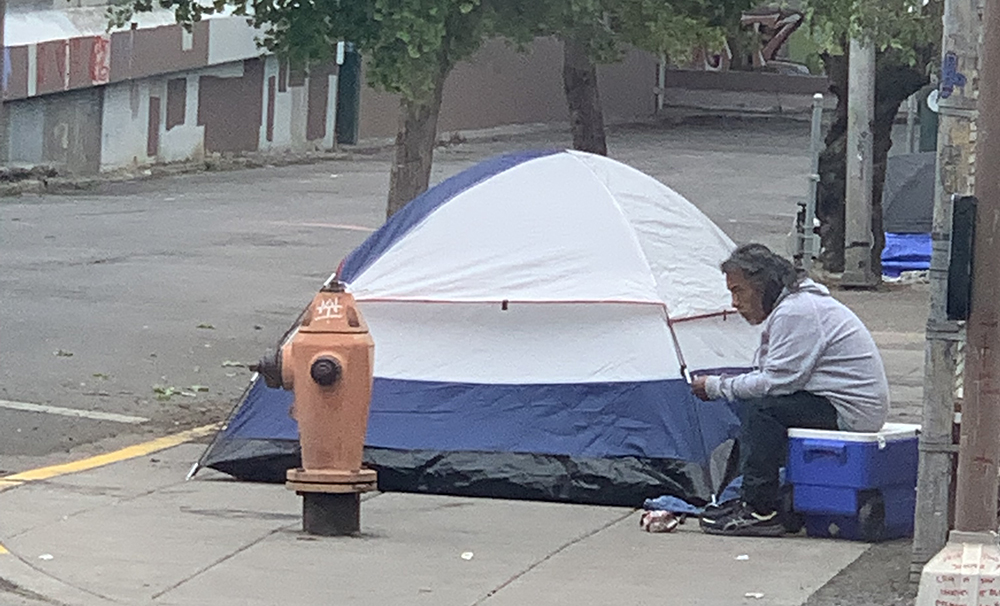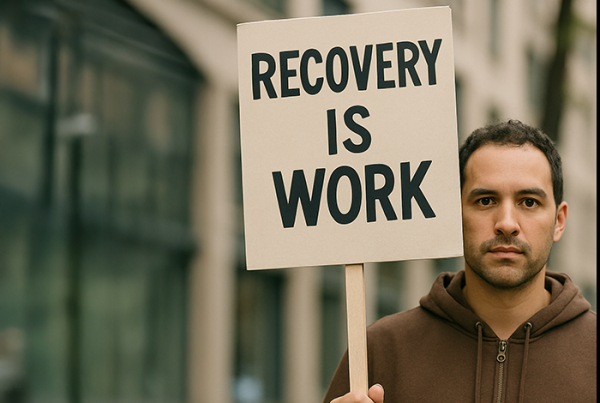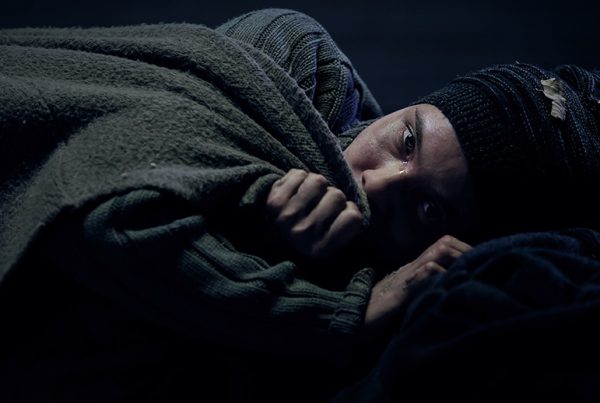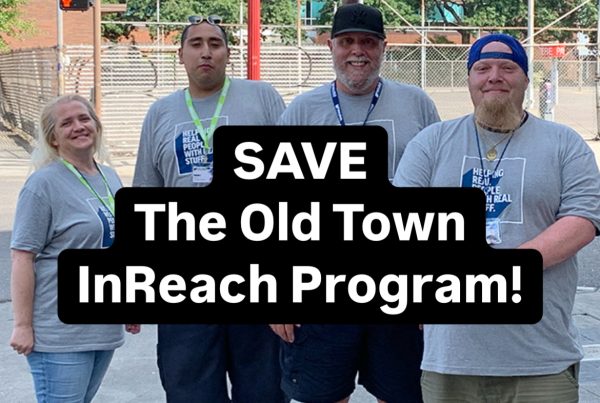An individual’s homelessness can be caused by more than a lack of affordable housing. Tailored care and support paired with appropriate housing is needed for many people experiencing chronic homelessness.
I enjoy assisting with breakfast service in Blanchet House’s free cafe before I start my day as executive director of the organization. It’s a chance for me to fully engage in our mission and an opportunity to get to know many of our regular clients and dedicated volunteers. Service in the café has greatly increased my understanding of the complexity of an individual’s homelessness, too.
One houseless woman I often serve at breakfast, I’ll call her C., is usually aggressively agitated. She shouts at everyone and no one. Much of the time, her words are unintelligible. We’ve grown to understand how to serve her best though. C. prefers to receive food and coffee to go because sitting indoors at a table is difficult for her. It takes a skilled staff member to serve her because she can be unpredictable with her actions. C. has thrown food and even punched at people.
Adding to the complexity of C.’s behavior is the fact that she often clearly and politely stops a verbal tirade to ask me, “Can I have a coffee please?” She always says, “Thank you.”
It’s quite surprising at first until you get to know C. more.
There are days when C. is peaceful and quiet. Last week, she was excited to show me two colorful children’s books she had in her backpack.
I can only guess what is causing C.’s behavior—maybe mental illness combined with substance abuse? I’m confident that C. has endured a lot of trauma. Apart from whatever led to C.’s homelessness, her life in Old Town certainly is traumatizing.
After breakfast, when I sat down to read the news, I thought of C. and so many other people like her when I read the following headline.
Cause of Homelessness? It’s Not Drugs or Mental Illness.
Tell that to C., I thought.
This headline accompanied an article in the San Diego Union-Tribune, about a new study called Homelessness is a Housing Problem. Researchers Clayton Page Aldern and Gregg Colburn crunched data on homelessness in cities across the country to conclude that the cause of homelessness is a lack of affordable housing.
Colburn said, “You could fix all the addiction in San Diego right now and you’d still have a problem with homelessness because there just aren’t places for people to go who have lower levels of income.”
The study makes a compelling case that our cities, especially Portland, need a significant influx of affordable housing if we are to reduce the number of houseless people in our community.
Of course, I agree. But unfortunately, in many articles, posts, and tweets I’ve seen about this study, the nuance is lost. There is a rush by some to dismiss mental illness and substance abuse altogether, barely recognizing them as contributing factors to a person’s homelessness. This even though Aldern and Colburn call out mental illness and addiction as contributing factors.
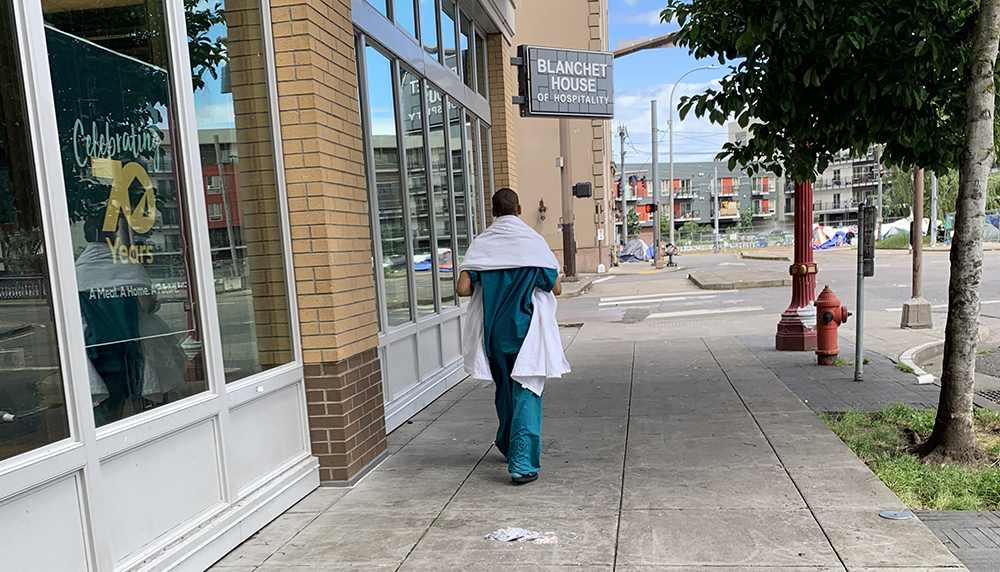
A woman wearing hospital scrubs and carrying a blanket leaves Blanchet House’s free cafe in Old Town, Portland.
Chronic Homelessness is Complex
And there often is no mention of other important variables of housing insecurity such as low wages, high health care costs and lack of insurance, predatory property owners, unsafe living situations, and mass incarceration. Moreover, the link between houselessness and transgenerational racism, discrimination, and poverty is hardly being discussed.
In the public reaction to Aldern and Colburn’s study, there is rarely a mention of the role trauma plays in a person’s homelessness.
I do not dispute the study’s findings. There’s no question a lack of affordable housing is at the heart of houselessness. As the study’s authors acknowledge, the solution to houselessness is revealed in the very word houselessness.
Yes, we need more affordable housing. Is that really a mystery anymore?
But let’s not dismiss or erase the roles mental illness and addiction play in a person’s chronic homelessness. People like C. need more than an affordable apartment provided to them. They need lifelong highly specialized care and support to stay housed.
There is not only one kind of homeless person. People’s experiences are varied and unique. Many of the people Blanchet House serves in its Old Town café are chronically homeless. This means they have been houseless for a very long time or many times throughout their life.
A person’s homelessness can persist because they are more difficult to house due to mental illness, addiction, and/or disabilities. The chronically homeless can become fearful of accepting housing after traumatic experiences with short-term shelters and social service requirements. They may have been unsuccessful at housing before, so they are afraid of failing again.
As counterintuitive as it may seem to you and me, they may feel safer and more confident on the street in a tent or doorway.
While I don’t want to say it is impossible to house these individuals, we must not understate how incredibly challenging it will be and that many individuals like C. will require specialized housing communities and intensive, consistent, expert support.
A message lost in the headlines, posts, and tweets.
Scott Kerman is the Executive Director of Blanchet House.














